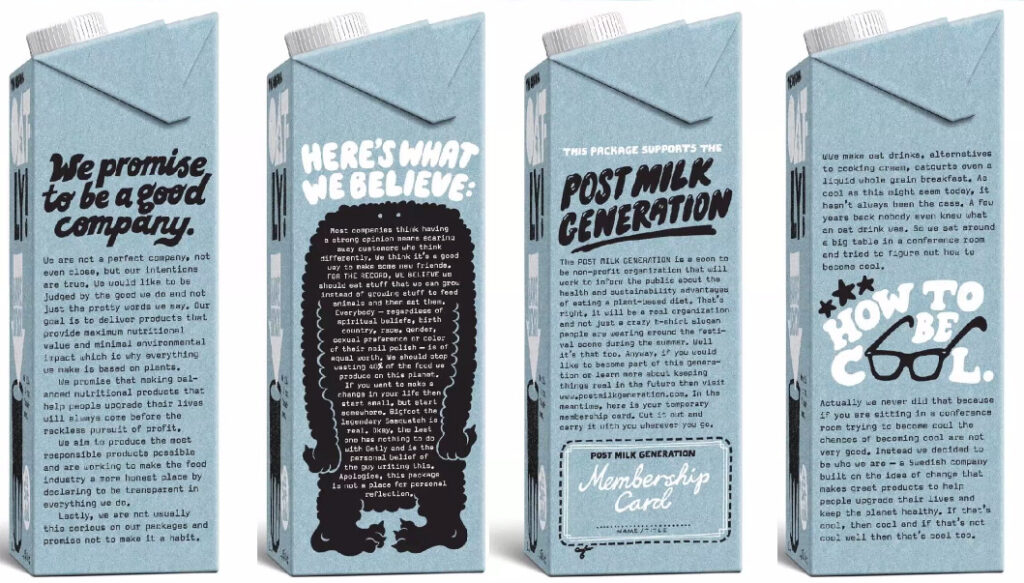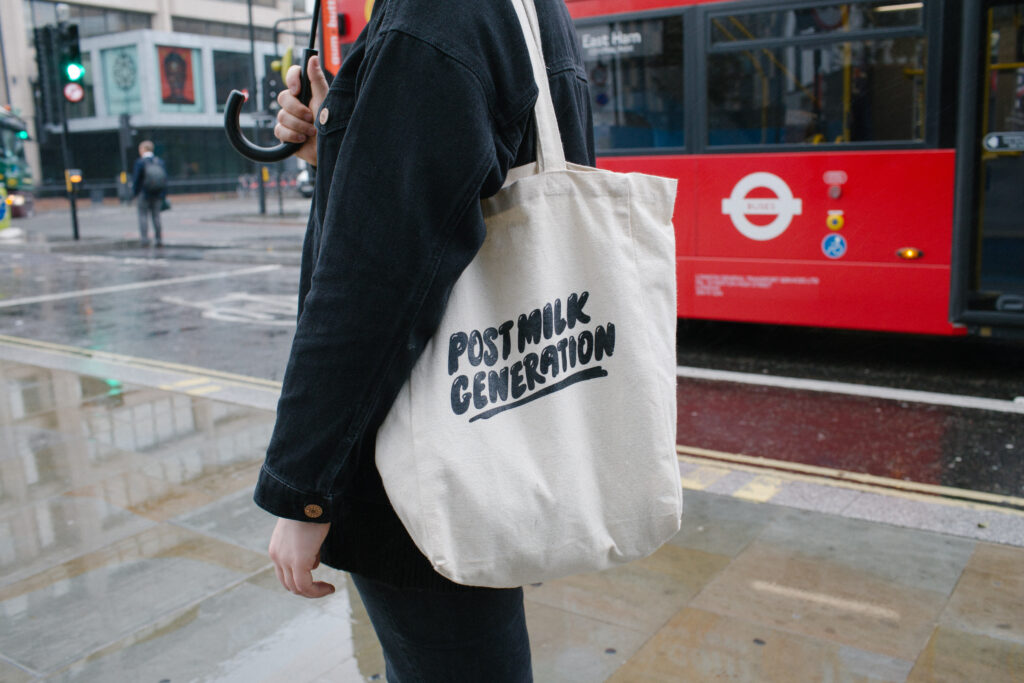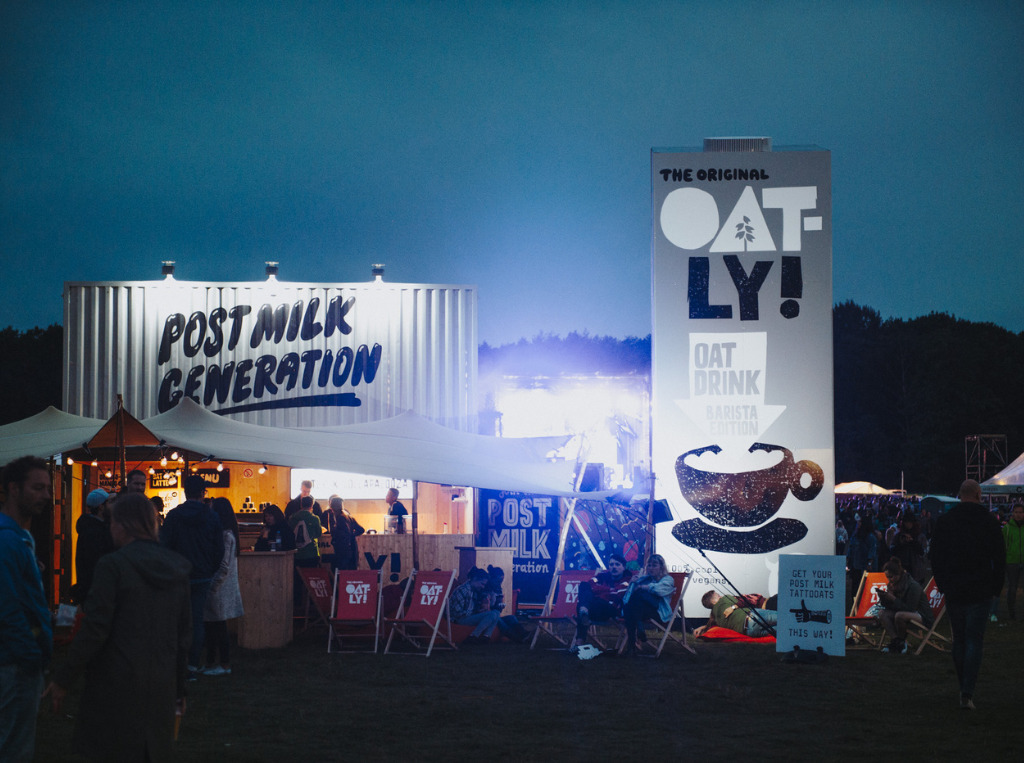Are You Stupid?: Oatly Wins Landmark Legal Battle Against UK Dairy Association to Keep ‘Milk’ On Its Packaging
7 Mins Read
A British High Court judge has sided with Oatly in a court case filed by Dairy UK, which objected to the use of the word ‘milk’ in its ‘Post-Milk Generation’ slogan on its product packaging and merchandise (citing consumer confusion), in what is a rare labelling win for a vegan brand.
Swedish oat milk giant has won a landmark legal battle against Dairy UK – the trade association for the country’s dairy industry, with members like Arla, Lakeland Foods and Saputo Dairy – after a judge ruled that its ‘Post-Milk Generation’ slogan did not create consumer confusion. This meant Oatly’s trademark for the phrase – granted in 2019 – has been restored (it was rescinded following Dairy UK’s complaint).
Product labelling is one of the biggest and longest-running issues faced by plant-based manufacturers around the world, who have been blocked by legislators upon requests from animal agriculture groups who consistently cite consumer confusion as a key concern. In the UK, alt-dairy products are banned from using terms like ‘milk’, ‘cheese’ or ‘yoghurt’ on their product packaging.
Along the same lines, Dairy UK argued that Oatly’s famous ‘Post-Milk Generation’ tagline creates confusion for the public, arguing that milk products are exclusively a result of “mammary secretion”. The trade body noted that the word ‘milk’ should be banned in any context on non-milk food packaging. But Justice Richard Smith rejected this claim in the High Court.

Why Oatly won its landmark UK dairy labelling case
The case, which has been running for four years, relied on pre-Brexit EU law, which restricted the use of dairy-related terms in non-dairy food and drink marketing. With words like ‘Milk’ and ‘cheese’ being protected designations, Dairy UK contended that Oatly’s use of ‘milk’ in ‘Post-Milk Generation’ was a violation of the law.
This was too broad an interpretation, and wasn’t something that would deceive consumers, noted Justice Smith. “Where [Dairy UK] appears to have fallen into error is to assume that the use of the term ‘milk’ in the marketing of products (or food products at least) constitutes, without more, the use of the ‘designation’ for ‘milk’ within the meaning of the regulation,” he wrote in his judgement. “However, it is the use of the term ‘milk’ for products to identify them as being milk, not merely its use in their marketing, that constitutes their designation as such.”
Essentially, he noted that using ‘milk’ the Oatly is, as part of a slogan instead of a direct descriptor of its oat milk (which it describes as ‘oat drink’ on product packaging), isn’t misleading to consumers, and that making that argument is a bit of a stretch.
Oatly’s trademark was registered for a variety of goods, including its product range of oat milks, cream cheeses, creams and yoghurts, as well as t-shirts as part of brand merch. In January, the Swedish company was awarded a trademark by the UK’s Intellectual Property Office (IPO) to use the slogan on T-shirts only. An IPO officer found that consumers were unlikely to be confused by the word ‘milk’ in the slogan, but still refused to grant it for food and drink.
The legislation leaves room for interpretation, and the fact that ‘milk’ isn’t allowed on non-dairy products meant that even in the context of a slogan that wasn’t describing the contents of the packaging itself, the trademark wasn’t allowed. “Although it may well have been used in their marketing, it does not purport to market them as any particular product, let alone as milk,” explained the judge. “The mark contains the word ‘milk’ and the goods are not milk.”

Plant-based labelling a challenge across the globe
It’s a common sense verdict, but one that Oatly will hope creates a precedent for inevitable future legal matters surrounding the labelling of vegan food. “Dairy [UK] takes a binary view of the matter: ‘milk’ appears in the mark and ‘milk’ may only be used for goods… which are: milk from animals, products derived from animal milk and composite products in which milk is an essential part. If they are not milk, the word ‘milk’ cannot be used in the trade mark,” the judge wrote.
“Were the appellant to market and sell in the UK an oat-based drink as ‘oat milk’, that designation would fall foul of the regulation… However, it would be open to the appellant to name one of its products as ‘oat drink’ since that name would not implicate the protected designations for dairy products.
“The use of the mark in conjunction with that ‘oat drink’ product would also be permissible since, although the former contains the word ‘milk’, the mark would not be used to market and sell the latter as ‘milk’, not being descriptive of a particular product rather than, as the hearing officer found, indicative of the appellant’s products more generally as being for those who no longer consume dairy milk.”
Justice Smith concluded: “It cannot be said that the mark ‘claims, suggests or implies’ that [Oatly’s] products marketed in conjunction with it are dairy products.”
The landmark win for Oatly goes to prove the notion that consumers aren’t, well, stupid. Yet countries around the world are hoping to ban (or have already banned) conventional terms on vegan meat and dairy analogues. In 2020, the EU infamously voted to uphold the ban for plant-based dairy products, despite lifting it for meat products (this was overturned in 2021, allowing companies to continue using these terms on dairy alternatives). In the US, the FDA has been under fire for its proposed labelling guidance for alt-milk.

The UK is reportedly stepping up its position against such labels too. Draft guidance has shown that even phrases like ‘sheese’, ‘yoghurt-style’, ‘mylk’, ‘b*tter’ and even ‘not m*lk’ could be prohibited, which has led to calls from plant-based organisations to clamp down on the proposed regulation.
“The guidance was drafted behind closed doors and without the consultation of the plant-based food sector,” said Marisa Heath, CEO of the Plant-Based Food Alliance UK. “Not only was this developed in an undemocratic process, it is also highly anti-competitive as it restricts consumer choice and seeks to curb a booming industry.”
She added: “Not only does the UK guidance assume consumers are stupid, it also goes beyond what is enforceable in the EU, which is ironic bearing in mind that the UK voted to leave the EU on the basis that it would not be tied down by European regulations.”
Are consumers really confused?
Jeremy Coller, president of the Alternative Proteins Association in the UK, said: “Civil servants must have a rather dim view of British consumers if they think shoppers find labels such as ‘vegan cheese’ and ‘soya mylk’ unduly confusing. People have been successfully buying such products for years now, without the need for officials to explain that oats and almonds don’t come from cows.”
This perception of consumers being confused and/or misled has been disproved several times. In 2020, a small 155-participant study revealed that people aren’t likely to think vegan products come from animal sources if they possess conventional labels. In the UK, the Chartered Trading Standards Institute surveyed over 2,000 people earlier this year and found that 76% of consumers believe a vegan label means it’s free from animal-derived products.
Oatly, which has had a rough couple of years (with sales declines, layoffs and product withdrawals among the major issues), recently offered Big Dairy brands ad space to showcase their climate footprint in a larger push for more transparent and mandatory eco-labelling. It was, however, subject to an ad ban by the UK’s Advertising Standards Authority in early 2022 for allegedly misleading consumers with unsubstantiated environmental claims.
The brand previously highlighted this idea of consumers being unaware with a tongue-in-cheek ‘Are You Stupid?‘ campaign. The Europe-wide drive came in response to the EU’s initial decision to continue the alt-dairy labelling ban, with humourous sarcastic ads in the brand’s trademark style intended to showcase how the law belied common sense.
Oatly joins only a handful of vegan brands – including US pioneers Tofurky and Miyoko’s Creamery and Swiss alt-meat brand Planted – who have emerged victorious in legal labelling battles. Facing a similar situation, Chilean food tech startup NotCo is in the middle of an appeal that prohibited the use of its NotMilk trademark in its home country, with a 590-person survey finding that 79% of people recognised it as a plant-based product, and only 0.1% confused it with dairy.
Can Oatly’s milestone win be a marker for more equitable legislation around alternative protein?



